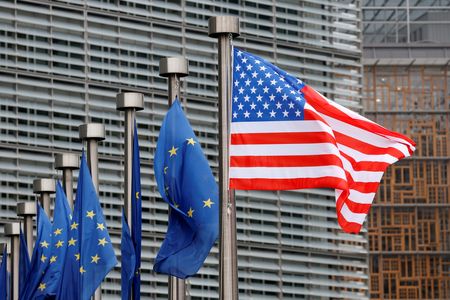 1
1 1
1

By Kate Abnett
BRUSSELS (Reuters) -The United States may be able to avoid the European Union’s plan to slap tariffs on imports of polluting goods based on its similar climate targets, the head of EU climate change policy said on Tuesday.
The 27-country EU is negotiating a plan to introduce the world’s first carbon border levy from 2026, forcing companies importing into the bloc to pay carbon costs at the border on certain polluting products such as steel, cement and aluminium.
The levy would apply to goods from countries with weaker climate policies than the EU’s, although the bloc has said some countries could be exempted if they have a domestic CO2 price akin to the one European firms pay under the EU carbon market.
EU climate policy chief Frans Timmermans said the United States could be granted this opt-out.
“If the United States has the same trajectory as we have in terms of emission reduction, then … the ‘carbon club’ is on the table. Because that means that the carbon footprint of a ton of steel in the U.S. is comparable to the carbon footprint of a ton of steel in Europe – then you don’t need a carbon border adjustment mechanism,” Timmermans told an event hosted by Columbia University in New York.
“This is probably not going to apply with other major trading partners. But between the EU and U.S., I don’t fear that… I think we’re still in parallel,” Timmermans said.
U.S. President Joe Biden has pledged to slash U.S, emissions by at least 50% from 2005 levels by 2030.
The EU has committed to cut its net emissions 55% by 2030, from 1990 levels – which works out at a 51% reduction against 2005 levels, according to the Rhodium Group.
The EU levy is designed to avoid to avoid “carbon leakage”, where companies relocate to regions with weaker climate policies.
It would cover some goods the United States sells into Europe, including steel, aluminium and fertilisers, although researchers expect the EU policy to have a bigger impact on countries including China – the world’s top manufacturer of steel and cement, which has previously criticised the EU plan.
(Reporting by Kate AbnettEditing by Marguerita Choy)